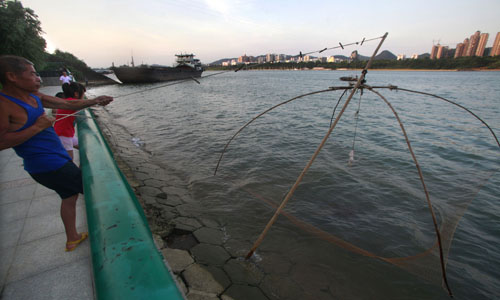Govt piranha bounty can net fishers 1,000 yuan

The hunt is on after a 1,000-yuan ($157) bounty was offered by the government of Liuzhou, in South China's Guangxi Zhuang Autonomous Region, to anyone who catches a piranha, one of which attacked two local men last weekend.
The resident, surnamed Zhang, said he was bitten by a piranha he caught and claimed he saw two others.
The ferocious, flesh-eating fish, and the bounty on their heads, have mobilized local anglers who have been fishing from the banks and trolling from boats on the Liujiang River.
Piranhas are native to the Amazon and the Paraguay rivers in South America.
"People, including members of Liuzhou Fishing Association and ordinary residents, are asked to go catch the fish with free meat provided by the city government," said Lu Zhengxiang, general secretary of the fishing association. "Anyone who catches a piranha will be given a reward of 1,000 yuan."
"In response to the official request, which was issued on Monday, our association has called on members to go fishing between 2 pm to 4 pm, as the species favors the day's highest temperature," Lu added.
The hunt will extend from the site where the attack occurred to include 15 kilometers of the river's banks.
"Over the past two days, there were about 30 to 50 anglers who were fishing for piranha," Lu told the Global Times.
Experts told the Global Times that piranhas are not likely to live through the winter as the water temperature of the Liujiang River drops below 15 C for many months.
"The attack on Saturday aroused concern over how the alien species got into the river. Some believe they were dumped in the Liujiang River by aquarium keepers," said an anonymous official from the aquatic department of Liuzhou Bureau for Fishery and Livestock.
The official pointed out that widespread fishing for the piranha might also harm indigenous fish in the river.
"No piranha has been found yet during the hunt over the past two days," the official said.
"The search for piranha in the city has even extended to the local aquaculture market, through which most alien species are introduced into the wild," he added.
"There is a lack of supervision on the aquaculture market in the country, since no specific rule exists to regulate the sales of these non-indigenous and carnivorous fishes," said Tang Wenqiao, professor with the Institute of Fisheries and Life Research at Shanghai Ocean University.
"However, sales of alien species, like piranhas, will not be regulated until experts can confirm they pose a danger," Tang told the Global Times.